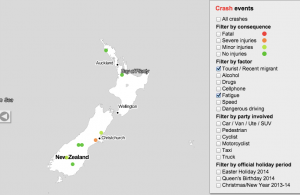Tired foreign drivers
This one makes sense as a possibility
However, road safety campaigner Clive Matthew-Wilson today slammed the new website a “dangerous waste of time”.
He has repeatedly called for tourist drivers to be banned from driving vehicles within 24 hours of arriving in the country.
“Driving tired is as dangerous as driving drunk,” said Mr Matthew-Wilson.
Obviously it matters how tired vs how drunk, but fatigue certainly is unhealthy in drivers.
There’s also the issue that almost 50% of foreign tourists have only come from Australia, not a terribly arduous trip, and that there are almost as many Kiwis returning from Foreign Parts as there are Foreigners visiting. Still, banning car rentals within 24 hours of a sufficiently long flight is something that wouldn’t need to be restricted to foreigners and so wouldn’t require withdrawing from the UN Conventions on Road Traffic.
It would be surprising if tired foreign drivers weren’t at somewhat higher risk of a crash. We’d still want data to see how many crashes we’re talking about. Is this rule going to prevent 10 fatal crashes per year, or 1 per decade?
We can get an initial idea from the National Crash Map built by Richard Law and Andrew Parnell and feature in the Herald Data Blog on Christmas Day.
Here are all the crashes from December 2013 to July 2014 where both fatigue and being a foreign driver were judged to be contributing causes. It’s an overestimate, since it includes fatigue from all causes rather than just from recent arrival, and in a multi-car collision even includes fatigue in someone other than the foreign driver. Also, it’s based on police judgment and maybe they overestimate or underestimate fatigue as a cause.
It’s a start.
Over this eight-month period there were no fatal crashes, one serious-injury crash, and two minor-injury crashes satisfying these criteria.
This is just two-thirds of one year, and a proper analysis would look at the data back to 2007 (or the more-limited data even further back). It’s still more data than the story provided.
Thomas Lumley (@tslumley) is Professor of Biostatistics at the University of Auckland. His research interests include semiparametric models, survey sampling, statistical computing, foundations of statistics, and whatever methodological problems his medical collaborators come up with. He also blogs at Biased and Inefficient See all posts by Thomas Lumley »

Just for completeness, one wonders whether NZ returning from overseas will also be banned from driving for 24 hr. Would the road safety campaigner advocate NZers travelling overseas also be banned from driving for 24 hr when we arrive there?
9 years ago
He doesn’t say, but the obvious implementation would be to ban renting a car within that period. This would primarily target non-residents, and would be hard to enforce on Oz and NZ permanent residents or citizens, since our passports don’t get stamped at entry.
9 years ago
I’d imagine that fatigue-related crashes as a result of a long-distance flight (if they existed) would be clustered within a few hours of an international airport (particualry Auckland given that’s the main entry point). It’s possible that the people took another internal flight, but those locations look pretty isolated.
9 years ago
The ones near Christchurch make sense, the others not so much. (Which is the point)
9 years ago
thank-you for the informative stats on foreign drivers – my partner and I have been looking for this kind of analysis since the ‘foreign driver’ debate resurfaced this year.
One comment on fatigue – my only car accident to date happened driving jet-lagged out of my driveway. I was definitely impaired, and should probably never have been behind the wheel. But, it was more like 28 hours after a 18+ hr flight, so would not have fit in the location/timeframe scenario you describe above. Any data on the length of time jet lag lasts?
9 years ago
Jet lag for 4-6 days isn’t unusual. I mentioned 24 hours mostly because that’s the sort of interval being discussed with reference to foreign drivers — phrases like “straight off the plane”
9 years ago